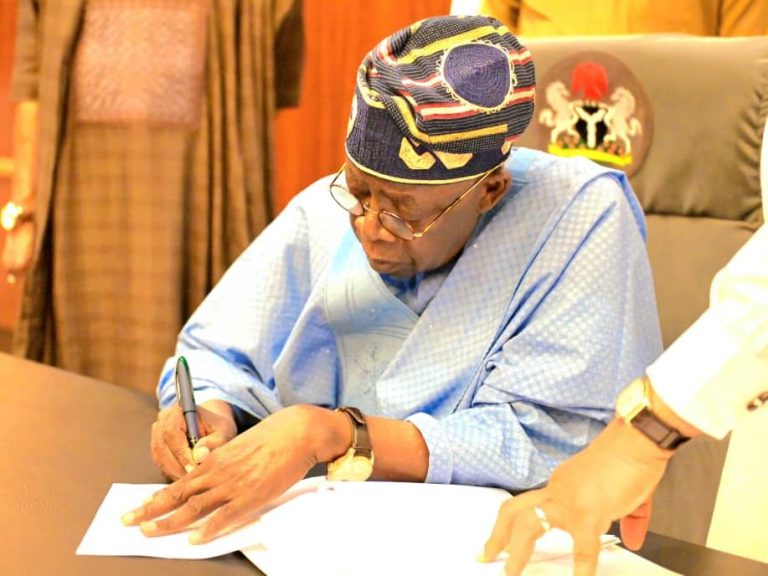President Bola Tinubu says his administration is working assiduously to reform the nation’s economic and business environment to promote efficiency.
Tinubu said this on Sunday during a bilateral meeting with the Chancellor of the Federal Republic of Germany, Olaf Scholz and his entourage, in the Presidential Villa, Abuja.
Tinubu and the chancellor engaged in three separate meetings before addressing a joint press briefing.
According to the Nigerian leader, the country has a very high deposit of gas availability and the investment environment as well as liquid natural gas is improving.
Tinubu said his administration had improved the nation’s business environment, saying, “we are going through several reforms.”
He also said that Nigeria was ready to encourage investment in gas pipelines and that the LNG would facilitate the shipment of liquefied gas to Europe.
According to him, the government will continue to promote the opportunity for the growth of businesses and their partners.
Tinubu said, “We are reforming our economic and business environment to promote efficiency.
“You might have read or been aware that we have removed oil subsidy.
“We’re going through tax reforms to eliminate double taxation and give you better returns on investments.”
According to the president, there are principles that will ensure that investment grows well and is protected.
He added, “We definitely welcome you to the collaboration; we’re happy this is happening to us.
“I believe that my friend will add more to the value of Nigeria’s environment; we have discussed that.
“I’ve made a commitment to you that we’ll promote efficiency, ease of doing business and remove all conflict areas that might be possible immediately.”
On the Federal Government’s alleged refusal to retrieve over 12,000 Nigerians who were unable to make Germany’s asylum provision and were at risk of deportation, Tinubu said that such persons were welcome to return home.
He, however, disclosed that both countries were working on regularising the stay of those who were economic refugees.”
The president said there was a very deep discussion in this direction, urging the separation of economic refugees from real refugees.
“We have a programme, to work in partnership, to really ensure normal migration and deepen the relationship in that area.
“I’m not making any demands; if they are Nigerian citizens, they are Nigerian citizens and they are welcome back home.
“Nothing should send them away; we are ready to enter into a partnership to improve the migration situation.
“Since other young and vibrant people can go through the process according to the immigration law of the country, to accept them as long as they are of good behaviour and good character.
“We are ready to work together in that direction,” Tinubu said.
Also responding to the migration question, Scholz said the debate was on and, very soon, the gray areas would be addressed.
He said, “The first is yes, there is a need, in Germany, for people that have talent and that want to work in our country in a way which is a regular path for migrants.
“We are working intensely in this field and we want to get (make) more progress and get things agreed in detail.
“The second part of this is also an agreement that those who do not have the right to stay in my country can go back and should go back.
“But this is where cooperation is also important; we will do so and it will be an important aspect of our work together.”
The German chancellor regretted that minerals were ‘just about extraction’ as they ended up in other countries rather than for Nigeria’s development.
“It is also important that we use the way of developing your economy in the fields of the minerals you have.
“I think that the investments into this structure must be easy but also beneficial for your country.
“It is something that bothered me a lot in the past that, sometimes, it is just about extraction which is not enough.
“There should be one bit more for making it feasible that some parts of the economic development can be used in the countries of origin.
“This is not the case today in our world but, if we change this a little bit, it will change a lot and work on this field is also important for us.”
According to Scholz, a lot of investments have to be taken, adding, ” looking at infrastructure; it’s not just about roads and railways.
“It is also about electricity, the infrastructure using the grid, making it feasible that all the produced energy or the power that is already there could go to the people.
“Finding a way how we can develop the economy in this field will also be important.”


